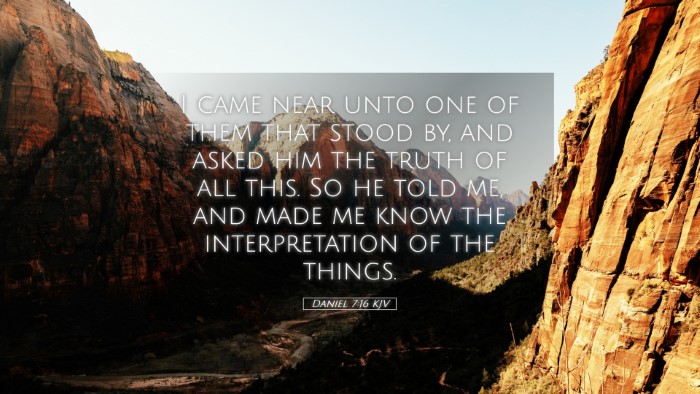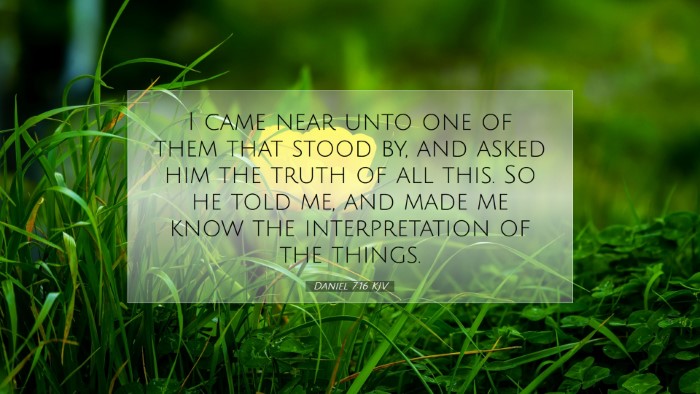Commentary on Daniel 7:16
Verse: "I approached one of those who stood by and asked him the truth concerning all this. So he told me and made known to me the interpretation of the things."
Introduction
The Book of Daniel, a critical text within the Jewish and Christian traditions, presents a vivid tapestry of prophecy and apocalyptic symbolism. Chapter 7, in particular, provides an intricate vision of four beasts representing empires and culminates in a heavenly judgment scene. As we consider verse 16, we find Daniel's earnest inquiry to an angelic figure who stands by, seeking understanding about the profound revelations he witnesses.
Contextual Background
This passage occurs after Daniel has been granted a vision of four terrifying beasts, symbolizing successive kingdoms. The fourth beast in particular, described as dreadful and exceedingly strong, prompts Daniel's deeper investigation into the nature of these visions and their implications for God's people.
Insights from Public Domain Commentaries
Matthew Henry
Henry emphasizes the importance of inquiry in understanding divine revelations. He notes that Daniel's approach to one of the heavenly beings illustrates the necessity of seeking wisdom and understanding from God. In a world filled with confusion regarding the nature of spiritual realities, Daniel’s example encourages believers to earnestly seek clarification from those who are knowledgeable in the ways of God.
Moreover, Henry highlights the willingness of the angel to engage with Daniel. This act of revelation is a reminder that God delights in making His truth known to those who earnestly desire to comprehend it. Henry writes, “When we are in the dark, we should seek to be informed by those that are in the light.”
Albert Barnes
Barnes provides a detailed exposition on the phrase "I approached one of those who stood by." He points out that this moment signifies the act of taking initiative, reflecting Daniel's role as a seeker of truth in a divine context. According to Barnes, it implies that understanding of prophecy often requires personal engagement and an active pursuit of knowledge.
Furthermore, Barnes speaks to the implications of the interpretation given to Daniel. He remarks that the angel delivers essential truths regarding the future and the ultimate triumph of God’s kingdom over earthly powers. The act of interpretation is not just dispelling confusion but building a foundation of faith in God's sovereignty amid chaos.
Adam Clarke
Clarke, known for his analytical approach, focuses on the significance of asking questions in the pursuit of understanding. He remarks that Daniel’s inquiry is crucial—it demonstrates humility and a recognition of the limits of human comprehension. Clarke asserts, “He who seeks knowledge must ask for it; divine wisdom is promised to those who diligently seek it.”
Clarke also examines the characteristics of the angelic being who provides the interpretation. He posits that this figure represents divine authority and wisdom, serving as a conduit for God's revelations. The interaction highlights the sacred nature of the knowledge being imparted and calls for a respectful and attentive posture from the seeker.
Theological Reflections
At a theological level, Daniel 7:16 encapsulates the nature of divine revelation. God's truth is rarely delivered in uncontextualized absolutes; rather, it often requires discovery through inquiry and dialogue. This dynamic illustrates an essential aspect of the relationship between God and humanity—God invites us into a discourse of understanding.
The Role of Angels in Revelation
The angelic figure serving as an interpreter suggests an established order in divine communication. Heavenly beings are depicted throughout Scripture as messengers, and their presence emphasizes the majesty and order of God’s plans. They facilitate human understanding of God’s will and convey reassurance amidst the tumult of earthly powers.
Encouragement for Seekers of Truth
The verse serves as an encouragement for pastors, scholars, and students of the Scriptures. It illustrates the importance of approaching God's mysteries with a willing heart and an eager mind. Daniel’s hunger for understanding resonates deeply, reminding us that profound insights often arise from humble inquiries. It prompts us to consider how we engage with the text of Scripture and with God in our quest for truth.
Conclusion
In summary, Daniel 7:16 encapsulates a profound moment of inquiry that is vital for our understanding of divine revelation. Drawing insights from the commentaries of Henry, Barnes, and Clarke, we are encouraged to seek knowledge fervently, recognizing that God is eager to illuminate our understanding of His purposes. As we approach the Scriptures, let us engage deeply and earnestly, following the example of Daniel, and trust in God's willingness to provide us with the clarity we seek.


